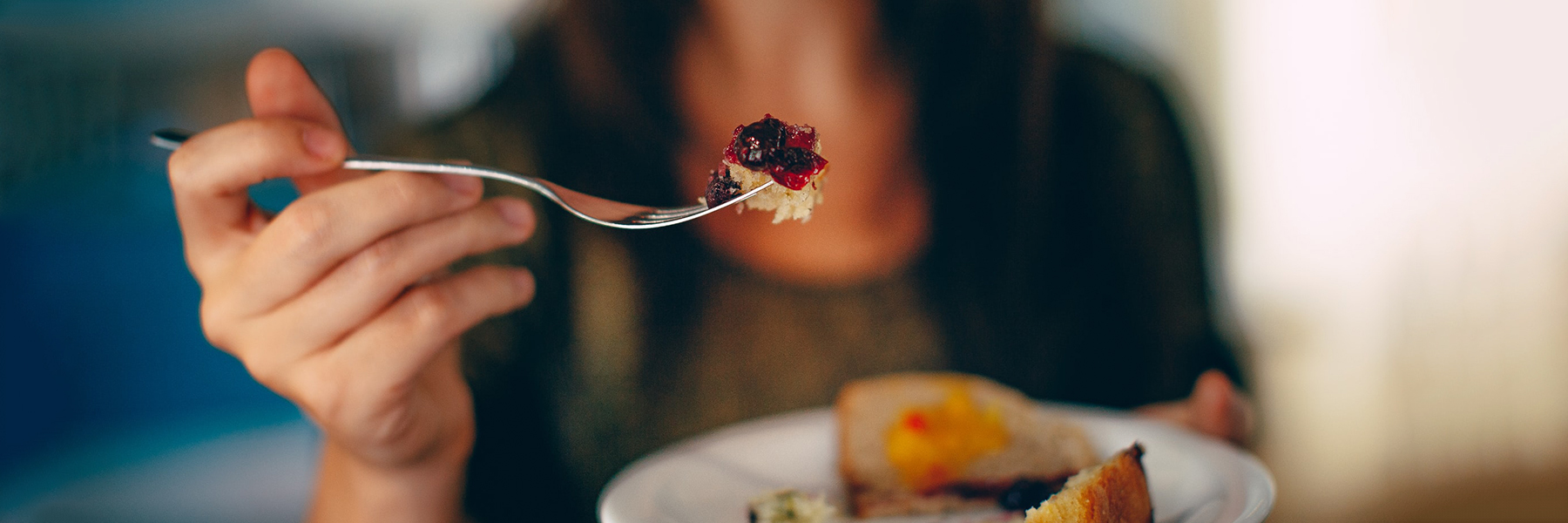How much do you think about eating? I don’t mean what you can eat next or how fast you can scarf down a couple of those tempting cupcakes someone left on the kitchen counter. I’m talking about whether you’ll be physically able to eat – even a sampling of breakfast or any other meal. As you may have discovered, some conditions, like myasthenia gravis, can make eating a real challenge.
Eating entails much more than getting the food from a plate, or your hands, into your mouth and then into your stomach. This basic process (and basis for life) is a very complicated process.
Eating is Hard Work
Eating involves the coordination of a lot of actions we don’t think about. “Some 50 pairs of muscles and many nerves work to receive food into the mouth, prepare it, and move it from the mouth to the stomach.” That’s 50 pairs of muscles that might refuse to do what you need them to do when you need them to do it—when you really need to eat something.
This happens in three stages and there’s a lot that can go wrong when you have MG. The first stage is the Oral Stage. This includes chewing the food to break it down into manageable size pieces (hopefully you haven’t taken too big of a bite to make everything more difficult). Chewing makes solid food the right size and texture to swallow by mixing the food with saliva. The tongue starts to work to further prepare the food for swallowing, with saliva softening and moistening the food to make swallowing easier.
Trying to coordinate when a dose of medicine kicks in while you’re eating is one way to better chew and swallow food in spite of MG sitting at the table with you. That can be tricky too, though. Something unexpected can throw the timing off of how you metabolize the drug or how long it takes for the food to be ready or if you can stop whatever you’re doing unrelated to meds or food preparation to take the time during that window of time to eat. So many challenges to eating that simple sandwich.
At times it can seem like a scene from the animated version of Cinderella—running down the staircase as the clock starts striking midnight and everything starts turning back into their original farm-form—pumpkin, mice, everything but the regal regalia she arrives in. Will you be able to complete the eating process before those 50 pairs of muscles collapse, ending the dining dream?
Or Being John Malkovich or The Avengers— will you get the nourishment into your stomach before the food has gone cold or completely congealed and not choke before the pyridostigmine portal closes? Sometimes distracting yourself – not overthinking the process can help. Always being aware on some level, though, of what’s happening or not happening inside your mouth.
Swallowing can have its own issues, and having a glass of water or other liquid you can safely tolerate is a good idea when you’re eating anything. The liquid can help the food continue on its journey to your stomach, along with mayonnaise, gravy, sour cream, or ketchup.
When swallowing becomes very difficult—dysphagia—contact your doctor immediately. If you’ve gotten to that point, coming back from it can be very challenging. Sometimes, if things get really difficult like you’ve almost completely lost the ability to swallow, swallowing exercise can help. A publication by MDA has some helpful suggestions about how to retrain yourself to chew and swallow and get your tongue to do what it needs to do.
After first consulting with your doctor and/or speech therapist, start coming back modestly to eating, with thick soups, and see how that goes. Progress to different types of foods of different consistencies until you feel comfortable and safe extending your swallowing “reach.”
There might even be times when you’ve remembered you haven’t eaten something for hours but you’re still not sure you can adequately chew and swallow. In times like these, liquid nutrition like Boost Very High Calorie, can help get you through.
Say you’ve gotten back to the point where you can chew and swallow comfortably. There are still times when chewing can become tiring. Maybe you’re actually eating a burger you’ve ordered in from a restaurant and it’s going okay. All of a sudden, your jaw starts getting tired. Maybe because it’s still getting used to the workout that was once second nature but now requires more effort. Take a break and take it easy.
And, while trying to have a sense of humor about all the hard work to get back to being able to eat without having to always work so hard to get food into your body, be resolute and don’t give up. Remember:
Food is an important part of a balanced diet.
—Fran Lebowitz

